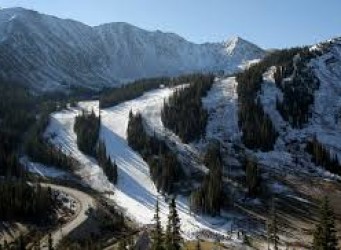I am continuing one more time with my messaging about the impact on the physical impact that a warmer climate will increasingly have on our society due to climate change. While skiers and the towns and businesses around the world that rely on an adequate snowfall and snowpack are well aware of the impact of a lack of snow in the mountains, there are much wider and more insidious consequences. It was a rude awakening for me years and years ago when I became aware of how much the entire world relies on the amount of snow that accumulates in particular in the Rocky Mountains each winter and gradually melts each spring and summer. I say “the world” because the United States Midwest is the breadbasket of the world. Consider this photo of the wheat fields of Nebraska and other surrounding states…
The water to irrigate most of these wheat fields are derived from and dependent upon the slowly melting snow of the Rocky Mountains that flow down from the creeks, streams and rivers. Not only will less snow be an enormous hinderance to farm production but with an earlier spring the water that does come down to the plaines is starting to come at the wrong time disrupting the growing season and further hampering production and yields.
Much of our food product goes overseas. We’ve been hearing a bit about this recently in light of Trump’s threat to start a trade war with China and how they plan to retaliate with a tariff on soy beans that would be horrible for Midwest farmers. The Pentagon is rightly warning of the severe consequences of climate change on war and peace and one of the reasons is how it will affect food production and thus trigger wars and other stresses creating refuges having to move from their homes to find food and jobs.
The “trickle down” effect (pun intended) of less water coming down from the Rockys and at the wrong time has enormous consequences for our planet and civilization in a myriad of ways. And it doesn’t appear that any of these are good.
Shrinking mountain snowpack will mean ‘a tight year’
Friday, April 6, 2018
Colorado’s snowpack is 66 percent of normal statewide, forcing an expansion of the federal drought designation to cover nearly 25 percent of the state.
Stream flows are predicted at half of average. Water suppliers are urgently trying to secure supplies as the state’s population continues to spike along the Front Range.
“There’s going to be people without water. It’s going to be a tight year,” said U.S. Department of Agriculture snow survey supervisor Brian Domonkos.
Denver Water is seeking federal approval to expand its storage in the Gross Reservoir, a controversial effort, as the snowpack in the South Platte River Basin remains very low.
State water managers, meanwhile, are considering using federal drought funds and implementing a program to ensure streamflows to protect endangered fish.
“We’re very closely monitoring the situation for impacts to make decisions about what we need to do next,” said Colorado Water Conservation Board climate change specialist Taryn Finnessey.
“Water providers are concerned. Those who have more storage are in a better position than those who rely more on direct flows,” she said. “This is something everybody from the agency level up to the governor’s office is closely watching to make sure we are ready to respond” (Bruce Finley, Denver Post, April 5). — NB




